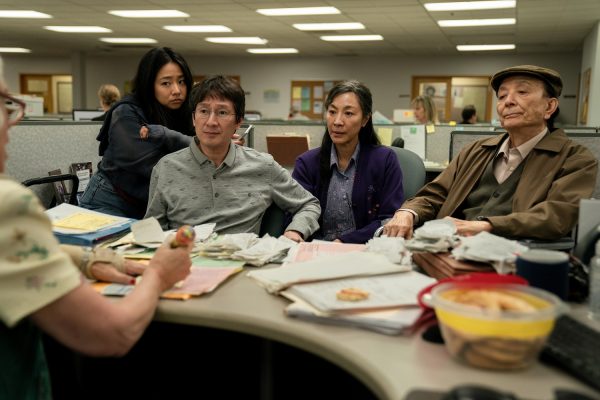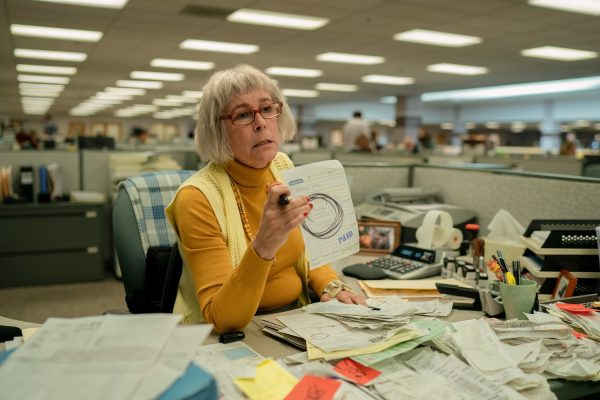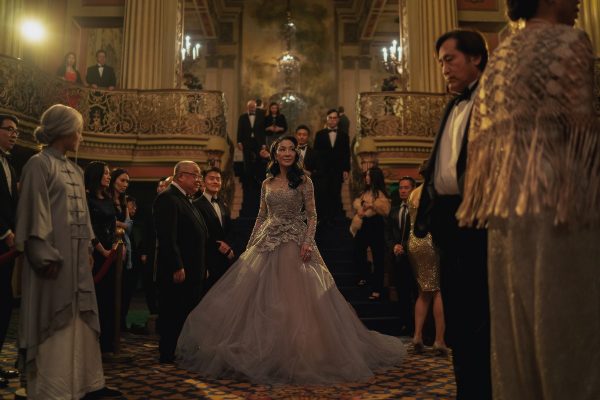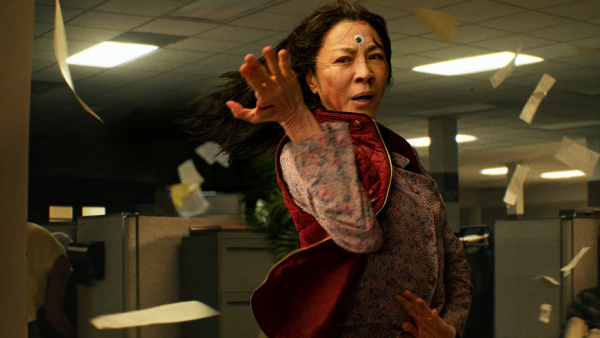‘Everything Everywhere’ puts multidimensionality on parade

“Everything Everywhere All at Once” (2022). Cast: Michelle Yeoh, Jamie Lee Curtis, Stephanie Hsu, Ke Huy Quan, James Hong, Jenny Slate, Tallie Medel, Brian Le, Andy Le. Directors: Dan Kwan and Daniel Scheinert (the “Daniels”). Screenplay: Dan Kwan and Daniel Scheinert (the “Daniels”). Web site. Trailer.
How well do “you” (sometimes called “the localized you,” the version of ourselves with which the majority of us are most familiar) know the totality of your true self? Chances are most of us aren’t even aware of the existence of any of the other parts of ourselves, let alone any of the particulars about them. But those well versed in metaphysical circles have a good sense about our innate multidimensionality and what that can do for us (as well as those other parts of ourselves). Some of this might sound somewhat cryptic, but making audiences aware of this phenomenon is what the new manic comedy-drama “Everything Everywhere All at Once” is all about.
When Evelyn Wang (Michelle Yeoh), the beleaguered owner of a laundromat, is simultaneously beset by an array of issues, it seems, like the movie’s title implies, that everything is hitting her all at once. For starters, there’s her milquetoast husband, Waymond (Ke Huy Quan), whom she’s grown tired of and wants to divorce. Then there’s her lesbian daughter, Joy (Stephanie Hsu), whom Evelyn is torn about when it comes to dealing with her lifestyle and partner, Becky (Tallie Medel). Compounding all that is her father, Gong Gong (James Hong), an aging, high-maintenance senior, who recently arrived from China. And, as all of this is going on, she struggles to operate the business and plan a Chinese New Year party.
But, if all that weren’t enough, Evelyn and Waymond are also facing the scrutiny of an IRS audit, an investigation assigned to a hard-nosed, no-nonsense agent, Deirdre Beaubeirdra (Jamie Lee Curtis). Deirdre, it seems, has no life outside of her work, so she meticulously devotes all of her time, energy and effort to ruthlessly probing the details of the tax returns she’s assigned to review. She prides herself on the many awards she’s received for her scrupulously attentive work, and, as she performs her initial analysis of the Wangs’ return, she gleefully salivates over what she sees, already picturing herself nabbing another trophy.
As all of this is going on, however, events start taking some extremely strange turns. Beginning as early as the elevator ride up to the IRS office and continuing once inside, Evelyn begins having what seem to be visions, out-of-body experiences, and auditory and visual hallucinations. Given that they occur so suddenly and unexpectedly, she’s totally unprepared for them. Given that they involve concepts she’s never heard of before, she doesn’t know how to respond. And, given that the information associated with them appears to be delivered by someone who claims to be an otherly dimensional version of Waymond, she’s confused beyond belief. But one point that comes through loud, clear and repeatedly is the alternate Waymond’s contention that this version of Evelyn is the one he has been seeking for ages. And, in explaining what he means by this version of Evelyn, he raises the concept of “the multiverse,” the aggregate amalgamation of all the different universes that can potentially exist and in which all of us have an alternate self in existence.


So why does the alternate Waymond want this Evelyn? He says it’s because she possesses certain specialized talents that none of her counterparts have. And, as for the skills in question, the alternate Waymond says it’s her abilities for being able to effectively take on a growing evil that threatens the viability of the multiverse. He says it’s up to her to fix things or face the possible destruction of the multiverse. But, as for what those skills are, Evelyn doesn’t have a clue, especially since she has virtually no awareness or understanding of the multiverse in general, let alone how to repair it. So now what?
It’s at this point that the film launches into a grand adventure whose narrative is far too complicated to explain here. Suffice it to say, however, that the Evelyn viewers meet initially learns about the nature of the multiverse and what it can enable for each of us. This includes the ability to tap into parts of our “selves” that we previously knew nothing about, such as their skills, knowledge, attributes and talents, qualities that we can tap into and draw from in being able to resolve the issues we each face in our “home” universe. It’s an enlightening and educational experience, one that teaches us about ourselves, our “selves” and how the two can interact for the betterment of each other. It’s quite a wild ride indeed.
There are no doubt times when we’ve all thought ourselves to be more than what we’re immediately aware of. We may have only a vague notion of what that actually means, but we’re nevertheless aware that there’s something to that undefinable but undeniable quality. That fuzzy intuitive impression may seem like something that’s easily dismissed, yet it’s something we shouldn’t ignore. The reason? It provides us with an important clue to the true nature of our being.


Those who are well-versed in metaphysical studies understand that such impressions are intended to help us grasp the multifaceted, multidimensional nature of who we are. The “localized” version of ourselves is understandably the one with which we’re most familiar, but it’s only one part of something larger, a “being” that goes by various terms, such as “higher self,” “multidimensional self” or “oversoul.” The other individualized components of that greater self – often referred to as “counterparts” – reside in other dimensions or other “universes” in which they possess various attributes, some of which may be similar to ours, others of which may be remarkably different. In either case, we possess connections to those other selves, whether or not we’re aware of them. However, should we become cognizant of them, it’s possible to forge significant bonds with them, linkages that can prove to be beneficial to both them and us.
Those unfamiliar with these notions may well ask, how is all of this possible? As implausible as it all may sound to some, we can chalk it up to the philosophy of conscious creation, which maintains that we each manifest the reality we experience through the power of our thoughts, beliefs and intents. And, given that the range of these resources is inherently infinite, it makes possible an infinite range of materializations, each of which occupies its own corresponding dimension or universe, all of which, when taken collectively, constitute the multiverse, the concept to which Evelyn is introduced for the first time.
Like many of us, Evelyn initially looks upon the concept with skepticism. However, when she has an opportunity to experience those other dimensions and to interact with those other selves, she can see the qualities they each possess. Those attributes run the gamut of possibilities, from the ridiculous to the sublime to the inspiring. In one permutation, for example, Evelyn meets her other self from a universe in which everyone has hot dogs for fingers. In another, she sees herself as a seasoned kung fu master. And, in yet another still, she views Evelyn the glamorous and successful movie star.
At first glance, some may look upon this and heave a heavy “So what?” But, upon closer inspection, we might begin to see the value in this. When we consider the skills these other selves possess, we might also be able to understand how we can draw from them to benefit our localized selves. For instance, when alternate Waymond tells the local Evelyn that she has the skills necessary to take on the growing evil threatening the existence of the multiverse, she initially has no idea what he’s talking about. However, when she sees the other Evelyns, she begins to grasp how she can draw from their experiences to hone her abilities for taking on the task at hand. Her kung fu master self, for instance, shows her localized counterpart how to employ her previously dormant fighting skills when called upon. And so it goes with each of the alternate selves localized Evelyn meets, enabling her to amass a repertoire of abilities that will stand her in good stead for tackling her ultimate task.

Evelyn thus sets an inspiring example for the rest of us. She shows us how she’s able to become more than who she thought she was. She opens her mind to possibilities that she hadn’t previously considered. She tosses aside fears and limitations that have been holding her back. And she draws from these experiences to alter her beliefs and her reality in ways she had never envisioned. Through this process, the various problems that had been hitting her with everything from everywhere all at once suddenly don’t seem like the foreboding issues they once did. It’s as if she’s able to become her own superhero, capable of taking on whatever challenges she faces – and succeeding.
In light of the foregoing, multidimensionality probably doesn’t sound as far-fetched or ridiculous as it once may have. Instead, it can be viewed as the valuable tool it truly is. And, given that, it might not be so easily dismissed. All it takes is opening our minds to the possibilities and availing ourselves of them when they present themselves. Worth a try, wouldn’t you say?
“Everything Everywhere All at Once” is quite a film, in some ways a masterpiece and in others a project in need of work. This insightful and hilarious exploration of an array of heady philosophical, metaphysical and moral concepts is, in many respects, a visual assault on the senses but one that’s punctuated by stunningly clever visual effects, huge laughs, uproarious send-ups of a variety of other films, and dynamite performances by Michelle Yeoh and Jamie Lee Curtis. In many ways, it reminds me of the recent release “Strawberry Mansion” but on steroids. Unfortunately, however, that’s where the picture gets itself into trouble. In its attempt to cover a lot of ground, it gets bogged down by its own content, going on far too long and telling a story that could have easily been trimmed by about a half-hour. This could have been accomplished by eliminating some bits that overstay their welcome (such as its take-offs of martial arts movies, which start out funny but grow tiresome after a few too many run-throughs). It also would have worked better by focusing on its philosophical and metaphysical themes and deleting the moral concepts, which don’t work as well and only serve to slow down the overall pacing. This offering from directors Dan Kwan and Daniel Scheinert (the “Daniels”) is certainly an ambitious and inventive release, but it’s unfortunate that the filmmakers didn’t know when to stop. It’s indeed worth a look, but it’s regrettable that the directors didn’t have the wherewithal to “kill their darlings” and quit while they were ahead. The film is currently playing theatrically.
It’s been said that there are times when we all exceed our expectations, becoming more than we thought we could be. Indeed, in these situations, we truly surpass the sum of our various parts. For instance, one need only look to the many examples of individuals who exhibit feats of superhuman strength during times of crisis. Where does that come from? It’s hard to say, but perhaps those individuals have alternate selves who dwell in dimensions where such capabilities are the norm and they’ve learned how to tap into those abilities and employ them in this reality. Whatever the source, however, what matters most is the ability to make the connection and put it to use when it truly counts. Evelyn seems to have learned how to do this – and maybe we can, too.
Copyright © 2022, by Brent Marchant. All rights reserved.



